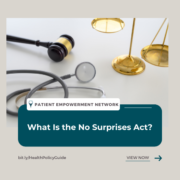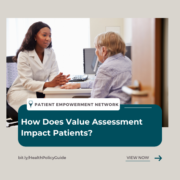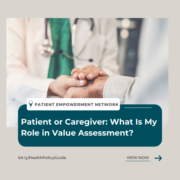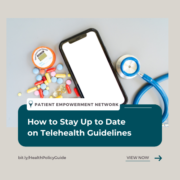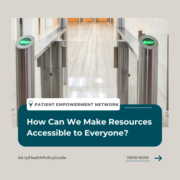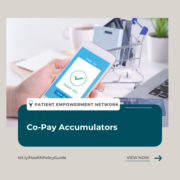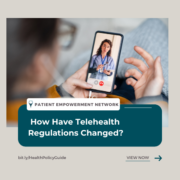What Is the No Surprises Act?
What Is the No Surprises Act? from Patient Empowerment Network on Vimeo.
Ashira Vantrees, JD of Aimed Alliance explains what surprise billing is and discusses how the No Surprises Act can affect different patients.
See More from the Health Policy Activity Guide
Transcript
Mary Leer:
In terms of fighting surprise billing or the No Surprise Act. What is surprise billing?
Ashira Vantrees:
Yeah, so surprise billing occurs when a patient visits a hospital or a doctor’s office that is in network, but then once there, they’re treated by an out-of-network provider. So, often the patient doesn’t know that when they’re in a network facility, they’re being treated by an out-of-network provider, and so then after the fact, after they received care from this out-of-network provider, they are sent a bill to the out-of-network costs for the care that they received. So, this is called Surprise billing, ’cause often patients are unaware that they even receive care from an out-of-network provider, and are expected to pay the full out-of-network costs for that care. So that’s one way we see surprise billing. Another way that we see surprise billing often occur is during surgical procedures, so if the patient is going to get a surgery and then they’re at in-network surgeon in-network hospital, but then during their surgery an out-of-network anesthesiologist used that out of network anesthesiologist they get a whole bill for that. So, it’s not even within the patient’s control, and they don’t even know, so, those are the two kind of big ways we see surprise billing occur.
Mary Leer:
Very important to know. Can you briefly describe the No Surprises Act and what does it impact, or how might it impact the insured or the uninsured?
Ashira Vantrees:
Yeah, absolutely. So, in December 2021, the Department of Health and Human Services also called HHS. They issued an interim final rule called the No Surprises Act, that would prohibit surprise billing for emergency services, prohibit out-of-network charges for ancillary services like the anesthesiologist during the surgery, and it would prohibit non-emergency services from charging out-of-network rates without obtaining notice and consent from patients. So, this rule became effective on January 1, 2022, and it applies to individuals who have group health insurance plans or individual health insurance plans, but it’s not going to apply to individuals who have Medicare, Medicaid, received care through the Indian Health Services or through the Veteran Affairs Administration because surprise billing has already been banned in those programs. It also does not provide any protection for individuals who are uninsured, but for individuals who are uninsured, it does require that when they’re out of doctor’s office or hospital, that the hospital or doctor’s office gives them a good base estimate of what the cost of that care is going to be before they receive the care.
Mary Leer:
Does the No Surprises Act supersede state laws? Could you explain that?
Ashira Vantrees:
Yeah, so sometimes that’s kind of the always lawyer answer maybe. So, the No Surprises Act supersedes state laws that provide less protection. So, the No Surprises Act is intended to act like a floor for protection, so if a state has a state law on surprise billing that provides greater protection than the No Surprise Act, that the law will prevail over the No Surprises Act, but any law that provides less protection, the No Surprises Act is going to supersede that law, but what’s also really important to note about the No Surprises Act is that it doesn’t limit state legislators’ ability, so if they have a law that is currently providing less protection than the No Surprises Act, it doesn’t limit their ability to create laws that provide greater protection than the No Surprises Act.

